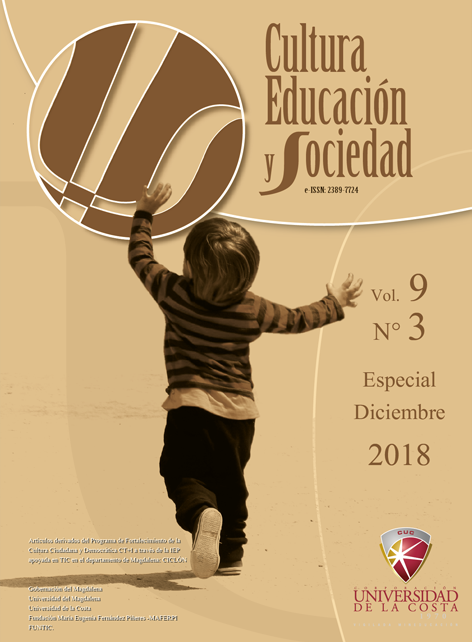Information and Communication Technologies, as a strategy to promote academic interest in students
DOI:
https://doi.org/10.17981/cultedusoc.9.3.2018.49Keywords:
Information and communication technologies, pedagogical strategies, academic interest.Abstract
Taking into account the incidence of new information and communication technologies in education today, the purpose of research in the implementation of information technology and communication students of the IED Foundation. Methodologically, the research was oriented from a Qualitative perspective, under the socio-critical paradigm; the analysis unit consisted of forty (40) eighth grade students between the ages of fourteen (14) fifteen (15) and sixteen (16) years; as a tool for gathering information, the collection instrument, the field diary; From the activities developed with the implementation of ICT in the classroom, students were found to have higher levels of motivation and interest in learning, significantly improving their grade point average when working with articulated curricular contents
Downloads
References
Aguaded, J. y Cabero, J. (2002): Educar en Red. Internet como recurso para la educación. Málaga: Aljibe
Avendaño, I. & Martínez, D. (2013). Competencia lectora y el uso de las nuevas tecnologías de la información y comunicación. Revista Escenarios, 11(1), 7-22.
Castro, S; Guzmán, Casado, D. (2007). Las TIC en los procesos de enseñanza y aprendizaje. Laurus, vol. 13, núm. 23, 2007, pp. 213-234 Universidad Pedagógica Experimental Libertador Caracas, Venezuela
Cerda, H. (1997). La investigación total. Cooperativa Editorial Magisterio. Bogotá́, Colombia.
Corredor, A & Sandino, M. (2009). Las TIC como herramienta de investigación científica. Góndola, enseñanza y aprendizaje de las ciencias, 4(1), 25-29.
Cortés, M; Orozco, L; Luna, R & Martínez, L. (2015). El Aprendizaje Distribuido, primer pasó a la virtualidad en la Enseñanza en el Nivel Universitario. Revista Iberoamericana de Producción Académica y Gestión Educativa.
Díaz, F. (2013). TIC en el trabajo del aula. Impacto en la planeación didáctica. Revista Iberoamericana de Educación Superior, 4(10), 3-21.
Gutiérrez, C; Carrera, M; Marín, F; Narváez, M; Pérez, C. (2006): Integración de Redes Académicas para la Gestión del Desarrollo Endógeno Regional. Multiciencias 6 (3), 257-263
Hernández, R. (2017). Impacto de las TIC en la educación: Retos y Perspectivas. Propósitos y Representaciones, 5(1), 325; Extraído de - 347 http://dx.doi.org/10.20511/pyr2017.v5n1.149
Hernández, R; Fernández, C & Baptista, P. (2014). Metodología de la investigación. México, D.F.: McGraw-Hill Education.
Karam, J; Buitrago, A; Fagua, A & Romero, Y. (2013). Estrategias de gamificación aplicadas al diagnóstico de la incorporación pedagógica de las TIC en una comunidad académica. Cultura, Educación y Sociedad 4(1), 55-74.
Maculan, A.-M., Jiménez , C., & Castellanos, O. (2015). Aprendizaje en el proceso de incubación de empresas de base tecnológica. Económicas CUC, 36(1), 15-48.
Marín, F; Inciarte, A; (1), Hernández, H y Pitre, R. (2017). Estrategias de las Instituciones de Educación Superior para la Integración de las Tecnología de la Información y la Comunicación y de la Innovación en los Procesos de Enseñanza. Un Estudio en el Distrito de Barranquilla, Colombia. Formación universitaria, 10(6), 29-38.
Mejía Jiménez, M., & Manjarrés, M. (2011). La investigación como estrategia pedagógica una apuesta por construir pedagogías críticas en el siglo xxi. Praxis & Saber, 2(4), 127. http://dx.doi.org/10.19053/22160159.1127
Mejía, M. R., y Manjarrés, M. H. (2010). Las pedagogías fundadas en la investigación. Búsquedas en la reconfiguración de la educación. Revista Internacional Magisterio, 42, 16-26.
Ospina, C. (2013). Las TICS como herramienta de motivación en el aula: Una investigación sobre la integración de las TIC en educación. Tesis de maestría, Universidad de La Sabana. Bogotá Colombia
Salinas, J. (2004). Innovación docente y uso de las TIC en la enseñanza universitaria. Revista Universidad y Sociedad del Conocimiento. RUSC, 1(1), 1-16.
Suárez, O. (2016). Aproximación al origen de la noción de objeto de aprendizaje: revisión histórico - bibliográfica. INGE CUC, 12(2), 26-40. https://doi.org/10.17981/ingecuc.12.2.2016.03
UNESCO. (2013). Enfoques estratégicos sobre las Tics en educación en América latina y el caribe. Recuperado de: http://www.unesco.org/new/fileadmin/MULTIMEDIA/FIELD/Santiago/images/ticsesp.pdf
Vallejo Calle, O. (2011). Adaptación laboral: Factor clave para el rendimiento y la satisfacción en el trabajo. Cultura Educación y Sociedad 2(1), 171 - 176. Recuperado a partir de https://revistascientificas.cuc.edu.co/culturaeducacionysociedad/article/view/946
Villalba, M., Hurtado, H., Guarín, H., & Casas, J. (2013). Innovación en pymes artesanales de Morroa, Sucre, 2012. Económicas CUC, 34(1), 15-28.
Downloads
Published
How to Cite
Issue
Section
License
Copyright (c) 2018 CULTURA EDUCACIÓN Y SOCIEDAD

This work is licensed under a Creative Commons Attribution-NonCommercial-NoDerivatives 4.0 International License.
![]()
Creative Commons 2020 CULTURA EDUCACIÓN Y SOCIEDAD
This article is under international license Creative Commons Reconocimiento-NoComercial-SinObrasDerivadas 4.0.
The published articles are the sole responsibility of their authors and do not necessarily reflect the opinions of the editorial committee.
CULTURA EDUCACIÓN Y SOCIEDAD respects the moral rights of its authors, who assign to the editorial committee the patrimonial rights of the published material. In turn, the authors inform that this work is unpublished and has not been previously published.
All articles are under a:
Licencia Creative Commons Atribución-NoComercial-SinDerivadas 4.0 Internacional.
![]()


 English
English
 Español (España)
Español (España)




_12.53_.27_p_. m_._3.png)





_12.57_.35_p_. m_._3.png)
_12.50_.37_p_. m_._3.png)



